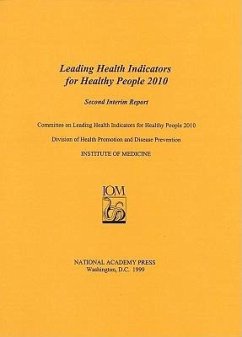During Spring 1998, the U.S. Department of Health and Human Services (DHHS) contracted with the National Academy of Sciences (NAS), Institute of Medicine (IOM) to conduct a multi phase project resulting in the development of sets of leading health indicators that would provide a 'face' for Healthy People 2010. Of equal or greater importance was the development of indicator sets that would attract and sustain public attention and motivation to engage in healthy behaviors. Development of such leading health indicators sets is intended to move the United States toward achievement of more positive health outcomes for the general population and for select population groups defined by race, ethnicity, gender, age, socio-economic status, level of education, and disability. This second interim report presents a summary of the efforts of the IOM Committee on Leading Health Indicators for Healthy People 2010 to develop sample sets of leading health indicators that would meet the requisite functions of attracting and sustaining attention and motivating engagement in healthier behaviors by the public. Reactions to this report and more specifically, to the potential leading health indicator sets and suggested measures, will be solicited from the public health community as well as representatives of diverse consumer audiences through electronic communication, regional public meetings convened by DHHS, focus group discussions with target populations, and other information-gathering techniques. Review of information from these various sources will be summarized in a third and final report for DHHS to be published in April 1999. The third report will also include the committee's final recommendations regarding the functions to be fulfilled by leading health indicators, will define specific criteria underlying the selection of leading health indicators, and will identify specific sets of leading health indicators to be promoted and monitored during the decade 2000 to 2010.
Hinweis: Dieser Artikel kann nur an eine deutsche Lieferadresse ausgeliefert werden.
Hinweis: Dieser Artikel kann nur an eine deutsche Lieferadresse ausgeliefert werden.








